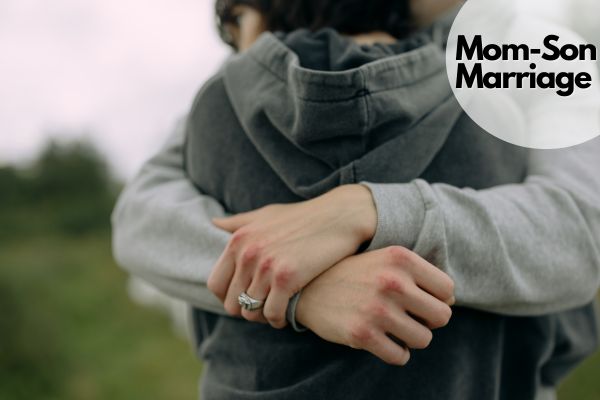Welcome to our article on mom-son marriage, a cultural practice that intertwines familial bonds and raises intriguing psychological questions. In this article, we will explore the cultural perspectives surrounding mom-son marriages, examining their historical significance and the beliefs that influence them.
Additionally, we will delve into the social dynamics and controversies surrounding this practice, considering its impact on family structures and the broader society. By investigating the psychological and emotional dimensions of mom-son marriages, we aim to shed light on the complexities and implications that arise from these unique relationships.
Definition Of Mom-Son Marriage
Mom-son marriage refers to a cultural practice in which a man enters into a marital relationship with his biological or adoptive mother. This unique form of marriage challenges traditional societal norms and is rooted in specific cultural contexts where it may be considered a legitimate and accepted union.
Mom-son marriage can encompass various degrees of intimacy and may involve emotional, physical, and sexual components. It is important to note that mom-son marriage is not a universally recognized or legally sanctioned form of marriage, and its practice varies across cultures and regions.
Cultures That Practice Mom-Son Marriage
While mom-son marriage is not a widespread or widely recognized practice, there are a few cultural contexts where it has been reported or historically documented. It is important to note that these instances are relatively rare and do not represent the majority of cultures worldwide. Some examples include:
1. Ancient Egyptian Royal Families
In ancient Egypt, it was not uncommon for pharaohs to marry their sisters or even their mothers to maintain royal bloodlines and consolidate power within the ruling family.
2. Inca Civilization
The Inca civilization in pre-Columbian South America is known to have practiced sibling marriage, including marriages between brothers and sisters or between a son and his mother. These unions were believed to strengthen family ties and ensure the purity of royal bloodlines.
3. Royal Families Of Hawaii
In ancient Hawaiian culture, it was reported that the nobility and high-ranking chiefs sometimes engaged in consanguineous marriages, including marriages between a son and his mother, as a way to maintain royal status and power.
4. Some African And Polynesian Tribes
In certain African and Polynesian tribes, there have been historical accounts of marriages or sexual relationships between mothers and sons. These instances are often linked to cultural or religious beliefs and may serve specific societal or ritualistic purposes.
It is essential to recognize that practices such as mom-son marriage are highly contextual and embedded in specific cultural, historical, and social circumstances. Moreover, societal norms, values, and legal frameworks have evolved over time, resulting in the decline or prohibition of such unions in most contemporary societies.
Impact On Family Dynamics And Structure
Mom-son marriage can have significant implications for family dynamics and structure, often challenging traditional notions of family relationships. The impact can vary depending on cultural context, individual personalities, and the specific dynamics within the family unit. Here are some general considerations:
1. Redefining Parent-Child Roles
Mom-son marriage blurs the lines between the parent-child relationship, as the traditional roles of mother and son become intertwined with those of spouse and partner. This can lead to role confusion and difficulty in establishing clear boundaries within the family structure.
2. Altered Sibling Dynamics
If there are other siblings in the family, mom-son marriage can disrupt sibling relationships and dynamics. Siblings may struggle to navigate their roles and adjust to the changed family dynamics, which can create tension and affect their relationships with each other and with their parents.
3. Emotional Challenges
Mom-son marriage can give rise to complex emotions within the family. Other family members may experience feelings of jealousy, betrayal, or confusion as they navigate their own emotions and come to terms with the new relationship dynamic.
4. Social Stigma And Isolation
Mom-son marriage often faces social stigma and disapproval from broader society. This can lead to isolation and strained relationships with extended family members, friends, and community members. The family may face judgment, discrimination, or exclusion, impacting their overall well-being and support networks.
5. Inheritance And Succession Issues
Mom-son marriage can create complications when it comes to inheritance and succession within the family. Legal and societal frameworks may not recognize the marriage, leading to challenges in property rights, inheritance laws, and the passing down of family wealth or status.
It is important to note that the impact on family dynamics and structure will vary greatly depending on cultural acceptance, individual beliefs, and the specific circumstances of the mom-son marriage.
Open communication, support from extended family and friends, and professional counseling can play a crucial role in navigating these complex dynamics and mitigating potential challenges.
Controversies And Challenges
Mom-son marriage is a highly controversial practice that presents numerous challenges, both ethical and practical. Here are some of the key controversies and challenges associated with this phenomenon:
1. Ethical Considerations
Mom-son marriage raises significant ethical concerns due to the violation of societal norms and the incestuous nature of the relationship. In many cultures, incestuous relationships are considered taboo and morally unacceptable. This raises questions about consent, power dynamics, and the potential for exploitation or manipulation within the relationship.
2. Psychological And Emotional Implications
Mom-son marriage can have profound psychological and emotional effects on both the individuals involved and other family members. The complex intertwining of familial and marital roles can lead to confusion, emotional dependency, and potential psychological harm. The individuals may struggle with identity formation, boundary issues, and conflicts between their roles as a son and spouses.
3. Social Rejection And Isolation
Societal stigma and rejection are significant challenges faced by those engaged in mom-son marriages. The relationship may be met with strong disapproval, leading to social isolation, discrimination, and the loss of social support networks. This can have detrimental effects on the emotional well-being and mental health of the individuals involved.
4. Legal Implications
Mom-son marriages are not legally recognized or supported in most jurisdictions. This can lead to legal challenges and complications in various aspects of life, including property rights, inheritance, healthcare decisions, and child custody. Lack of legal recognition can leave individuals vulnerable and without the legal protections afforded to traditional marriages.
5. Impact On Family And Community Relationships
Mom-son marriages often strain relationships within the family and wider community. Other family members, including siblings, grandparents, and extended family, may struggle to accept or understand the relationship, leading to conflicts and fractures in family dynamics. Community members may ostracize or distance themselves from the family, leading to further isolation and challenges in social integration.
It is important to approach these controversies and challenges with sensitivity and respect for cultural diversity and individual experiences. Professional counseling, support networks, and legal guidance can play a crucial role in navigating the complexities and mitigating the potential negative consequences associated with mom-son marriages.
Psychological And Emotional Implications
Mom-son marriage carries profound psychological and emotional implications for the individuals involved, as well as for other family members. The complex intertwining of familial and marital roles can give rise to various challenges and dynamics. Here are some key psychological and emotional implications:
1. Identity Formation
Mom-son marriage can create challenges in terms of individual identity formation. The roles of son and spouse become blurred, making it difficult for individuals to establish a clear sense of self. They may grapple with conflicting expectations and struggle to define their own identities separate from their familial roles.
2. Emotional Dependency
Mom-son marriages often involve deep emotional bonds between the mother and son. This emotional dependency can create challenges in establishing healthy boundaries and fostering individual autonomy. The individuals may find it challenging to develop their own emotional independence and rely excessively on each other for emotional support.
3. Oedipus Complex And Conflict
Mom-son marriages may bring forth psychological conflicts related to the Oedipus complex, as described by Freud. The son may experience unresolved feelings of attachment and desire toward the mother, potentially leading to emotional tensions and difficulties in establishing a healthy marital relationship.
4. Social And Cultural Pressure
Individuals engaged in mom-son marriages often face intense social and cultural pressure. They may experience judgment, stigma, and rejection from society, which can significantly impact their self-esteem, mental health, and overall well-being. The fear of social isolation and disapproval can contribute to internal emotional struggles.
5. Family Dynamics And Sibling Relationships
Mom-son marriage can disrupt family dynamics and strain relationships with other family members, particularly siblings. Siblings may experience feelings of jealousy, confusion, or resentment towards the individuals involved in the relationship. These dynamics can create emotional tension and affect the overall cohesion and functioning of the family unit.
6. Emotional Conflicts And Guilt
Mom-son marriages often evoke complex emotional conflicts within the individuals and their family members. They may experience guilt, shame, or internal struggles due to societal taboos and moral beliefs surrounding incestuous relationships. These emotional conflicts can have a significant impact on the individual’s psychological well-being.
It is crucial to approach the psychological and emotional implications of mom-son marriages with empathy and understanding. Seeking professional counseling or therapy can be beneficial in navigating these complex dynamics, facilitating individual growth, and fostering healthier relationships within the family unit.
Conclusion
The practice of mom-son marriage holds profound cultural and social implications, shaping family dynamics and societal norms. Our exploration of the psychological and emotional dimensions highlights the intricate bonds between mothers and sons, as well as the challenges they may encounter.
As we navigate the complexities of this topic, it becomes evident that further research, dialogue, and understanding are essential. By acknowledging the cultural diversity and psychological intricacies involved, we can foster greater awareness and empathy towards mom-son marriages, facilitating informed discussions and potentially guiding individuals and societies towards healthier familial dynamics and relationships.







